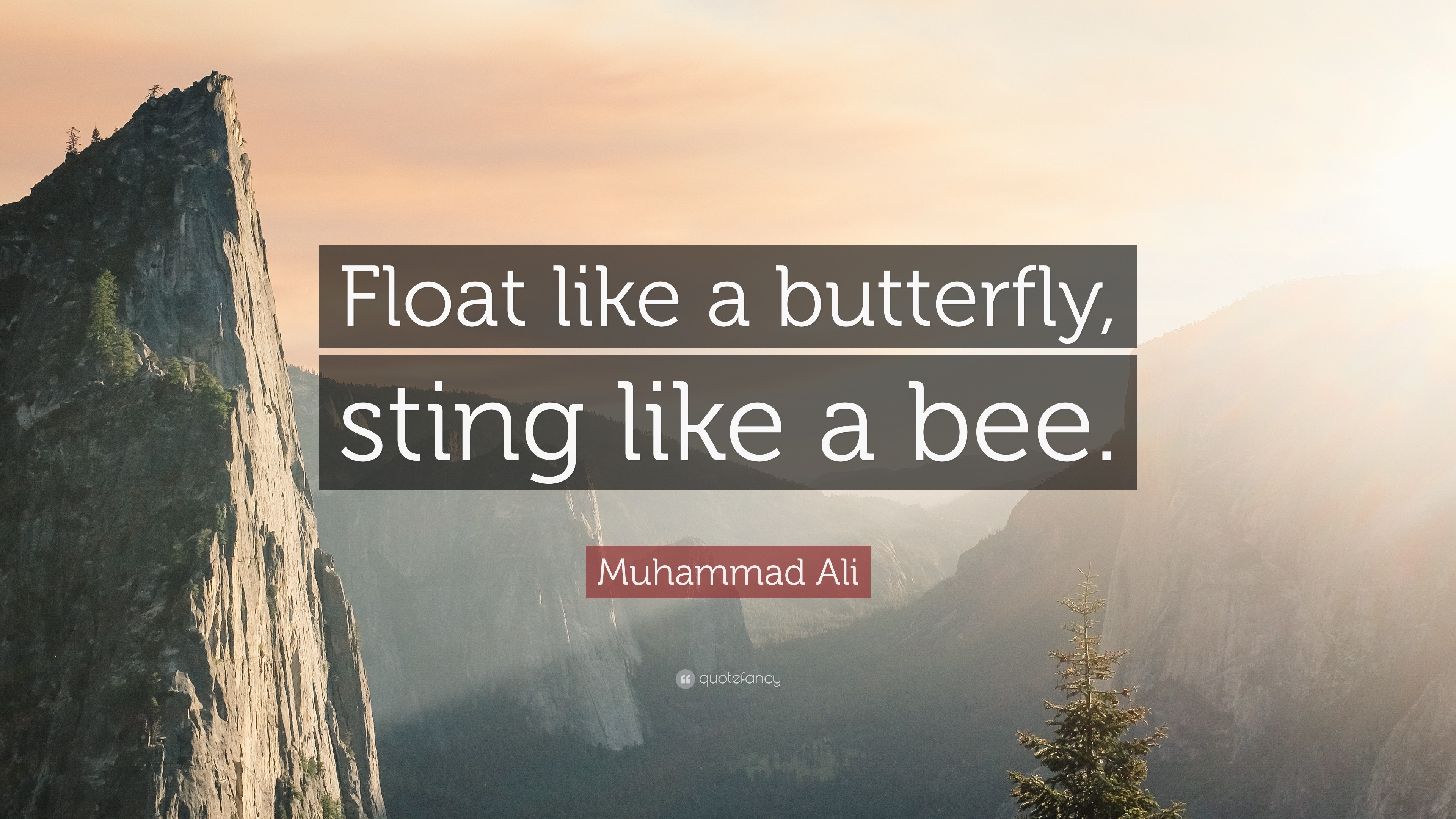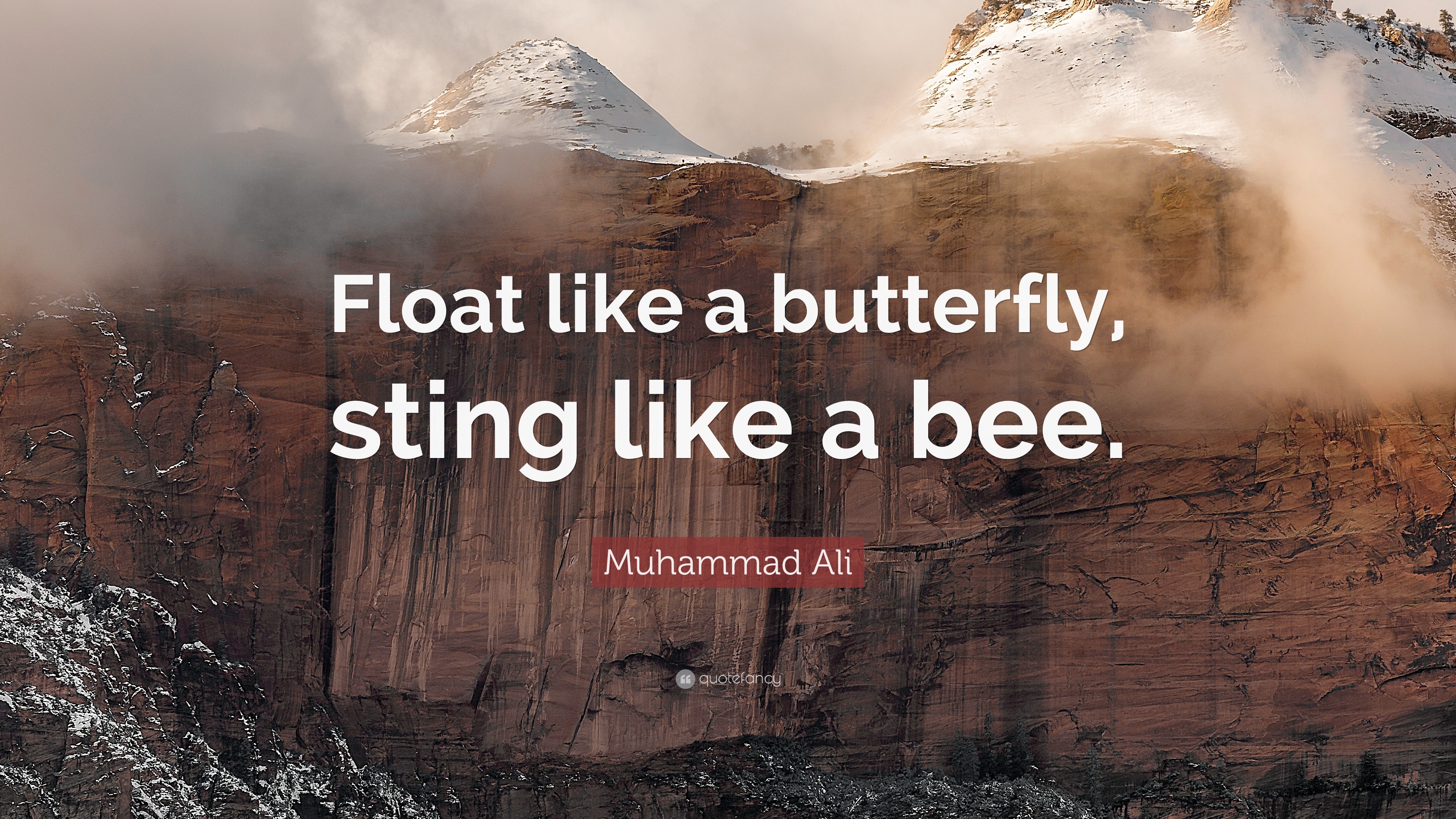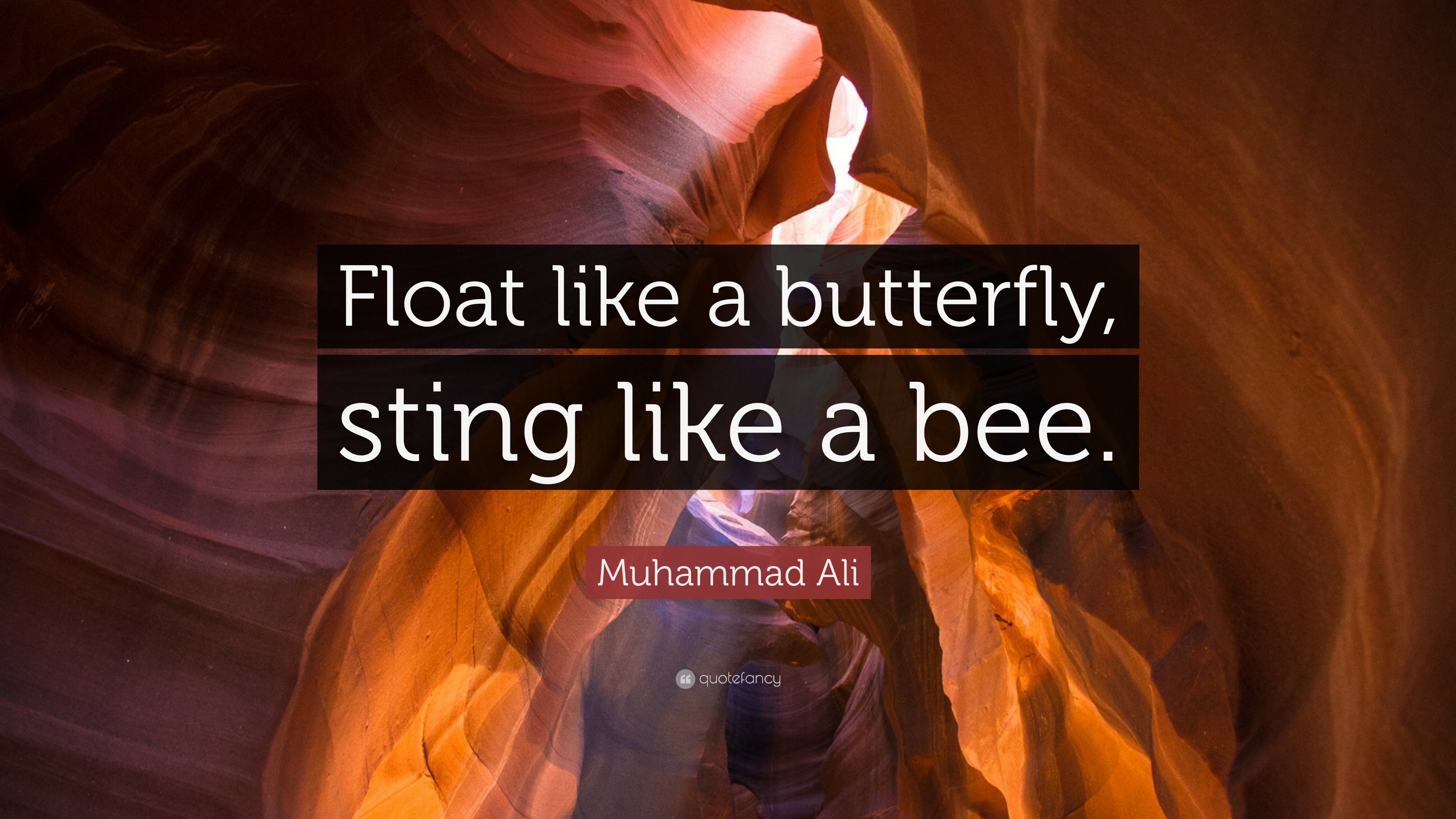Could a single phrase encapsulate the essence of athletic brilliance, the art of deception, and the power of a champion? "Float like a butterfly, sting like a bee" is more than just a catchy slogan; it's a philosophical statement, a tactical blueprint, and a testament to the genius of Muhammad Ali.
This iconic declaration, etched into the annals of sports history, wasn't merely a description of Ali's boxing style; it was the very embodiment of his approach. He was a dancer in the ring, his movements graceful and elusive, a stark contrast to the brutal power he unleashed. This paradoxical combination is what made him, arguably, the greatest boxer of all time. The phrase, a poetic masterpiece, transcends the realm of sports and has become a cultural touchstone, representing agility, precision, and the element of surprise. Even the most casual observer knows the phrase; it is instantly recognizable and readily calls to mind Ali's remarkable career.
The genesis of this now-famous phrase is subject to some debate. While Muhammad Ali is undoubtedly the face most associated with it, there's a compelling argument to be made that the original spark might have come from someone else. Drew "Bundini" Brown, Ali's assistant trainer, cornerman, and "spiritual advisor," has also been credited with coining the phrase. Regardless of its precise origin, the phrase perfectly captured Ali's unique boxing style.
- Denise Clark Bradford Son Gino Morrison Iis Passing News Updates
- Omar Abdulrahman More Emirati Footballers You Should Know
| Bio Data | Details |
|---|---|
| Full Name | Cassius Marcellus Clay Jr. (Later Muhammad Ali) |
| Born | January 17, 1942, Louisville, Kentucky, USA |
| Died | June 3, 2016 (aged 74), Scottsdale, Arizona, USA |
| Nickname(s) | "The Greatest," "The Louisville Lip" |
| Nationality | American |
| Weight Division | Heavyweight |
| Stance | Orthodox |
| Height | 6 ft 3 in (191 cm) |
| Reach | 78 in (198 cm) |
| Total Fights | 61 |
| Wins | 56 |
| Wins by KO | 37 |
| Losses | 5 |
| Draws | 0 |
| Professional Debut | October 29, 1960 |
| Years Active | 19601981 |
For further reference and more details, please visit the official website: International Boxing Hall of Fame.
His style was revolutionary. Before Ali, heavyweights were generally seen as plodding, powerful brawlers. Ali, however, was a master of footwork, constantly moving and making himself a difficult target. He would lean back, making opponents miss, and then unleash lightning-fast combinations. His hands were a blur, his footwork like a dance, hence the butterfly. He was not just a boxer; he was an artist in the ring, a poet with fists. The "sting like a bee" element reflected his ability to deliver devastating, precise punches that left opponents reeling. He could deliver a knockout blow with seemingly effortless grace.
Ali's words were as sharp as his punches. He had a gift for self-promotion, and his pre-fight pronouncements often became as legendary as his performances. He would taunt his opponents, predicting the round in which he would knock them out. He'd declare himself "The Greatest" and the world, for the most part, agreed. One of his most memorable quotes, "The hands can't hit what the eyes can't see," perfectly encapsulates his strategy. He was constantly moving, making himself unpredictable, rendering his opponents' punches ineffective.
- Aaron Brooks Stats Career Raiders Highlights What You Need To Know
- Naked Muscle Men Hot Videos Pics Explore Now
His words and actions combined to create a persona that resonated far beyond the boxing ring. He was a symbol of self-belief, confidence, and defiance in the face of adversity. This extended not only to his boxing career, but to his personal struggles outside the ring. When he refused induction into the US Army during the Vietnam War due to his religious beliefs, he risked imprisonment and the loss of his boxing career. His stance made him a lightning rod for controversy, but it also solidified his image as a man of principle.
Ali's impact on boxing is undeniable. He redefined the sport with his athleticism, his showmanship, and his unwavering self-belief. He was a promoter, a poet, a showman, and a champion, all rolled into one incredible package. But his impact extended far beyond the sport, and as a social activist, he stood against racial discrimination, and fought for human rights. Ali was a cultural icon, and a source of inspiration to people around the world.
The phrase "Float like a butterfly, sting like a bee" is a testament to Ali's brilliance. It is a concise and unforgettable encapsulation of his fighting style and his approach to life. It is a reminder of the power of grace, speed, and the element of surprise. His legacy lives on, not only in the history books but in the hearts and minds of people around the world. The phrase is so potent that it transcends time and culture, and serves as a reminder that the seemingly impossible can be achieved with talent, determination, and the willingness to defy expectations.
He wasn't just a boxer; he was a global phenomenon. His story is an example of how a person can change the world, not just with their physical prowess, but with their words and their unwavering commitment to their beliefs. Ali's influence can be seen today in the sport of boxing, and his words and actions still resonate with millions. He changed the way people thought about the sport, and he forced people to consider the political and social context of his time. The world is a better place for Muhammad Ali having lived and fought, both in and out of the ring. He was not just a boxer; he was an icon, a symbol of hope, and a true original.
The expression "sting like a bee" is a vivid way of describing a quick, unexpected, and effective action. The imagery is powerful: the butterfly's effortless grace, contrasted with the bee's sudden, stinging attack. The phrase became so popular it has found its way into literature, music, and popular culture, frequently invoked as a symbol of agility and power. The statement is a statement on how to achieve a goal in life.
The phrase continues to inspire and motivate people from all walks of life. It is a reminder of the importance of embracing one's unique strengths and of the power of believing in oneself. It is a reminder that strength and speed can work in concert to achieve success. This phrase is a timeless declaration of intent, a philosophy that champions grace, power, and the ability to defy expectations. It is a quote that will likely continue to resonate with people for generations to come.
Ali's famous quote is not only a description of his boxing style, but a perfect summary of his personality. Ali was a master of mental games, taunting his opponents and creating an atmosphere of intimidation. He would often use his quick wit and verbal dexterity to unsettle his opponents. The phrase "Float like a butterfly, sting like a bee" wasn't just a description of his fighting style; it was an extension of his personality, an embodiment of his confidence and his ability to outmaneuver his opponents both physically and verbally.
Ali's influence on boxing is hard to overstate. He revolutionized the sport, not only with his style but with his showmanship. He was one of the first athletes to understand the power of media, and he knew how to use it to his advantage. He was also a social activist, using his platform to speak out against racism and to promote peace and understanding. The phrase is a reminder of the importance of fighting for what you believe in. Ali's legacy is complex and multifaceted, but his impact on boxing, on sports, and on the world is undeniable. His life and career serve as an enduring inspiration.
The words of Muhammad Ali are still quoted widely. His words, which were crafted by him and Drew "Bundini" Brown, are part of what made him so legendary. In the boxing world and beyond, Ali's name is spoken with reverence. His achievements in the ring are legendary, but it is the combination of his athletic skills, his charismatic personality, and his outspoken social activism that made him one of the most iconic figures of the 20th century.
The quote is a legacy; the phrase continues to be relevant in both sports and the wider world. The quote encapsulates the essence of his boxing style, but it has also become a metaphor for life. It represents the power of agility, the element of surprise, and the value of believing in oneself. The quote has transcended the boxing ring. It's a statement about determination, strategy, and the pursuit of excellence. The phrase has become a part of our collective consciousness, a symbol of Ali's extraordinary legacy.



Detail Author:
- Name : Garry Rogahn
- Username : mcclure.americo
- Email : arnoldo.wyman@gmail.com
- Birthdate : 1997-05-01
- Address : 52720 Nayeli Village Suite 553 Wildermanberg, KS 42556
- Phone : 240-865-2616
- Company : Hoppe-Padberg
- Job : Hotel Desk Clerk
- Bio : A unde explicabo error dolorem et ratione. Quia voluptate voluptate et at ut beatae voluptatum. Voluptatem aut ut et odit eius voluptate aperiam amet.
Socials
tiktok:
- url : https://tiktok.com/@boyd_white
- username : boyd_white
- bio : Aliquid aut unde dolorum necessitatibus. Accusantium libero voluptatem minima.
- followers : 6834
- following : 1373
twitter:
- url : https://twitter.com/boyd_white
- username : boyd_white
- bio : Amet minima asperiores incidunt vel sint cumque aspernatur. Exercitationem corporis dicta quidem quasi ea natus qui. Accusantium libero a molestiae.
- followers : 1901
- following : 2828
facebook:
- url : https://facebook.com/white1989
- username : white1989
- bio : Molestiae perspiciatis sint excepturi aut nulla mollitia vel.
- followers : 1633
- following : 1669
linkedin:
- url : https://linkedin.com/in/boydwhite
- username : boydwhite
- bio : Rem culpa rerum neque dolore ut.
- followers : 2843
- following : 2604